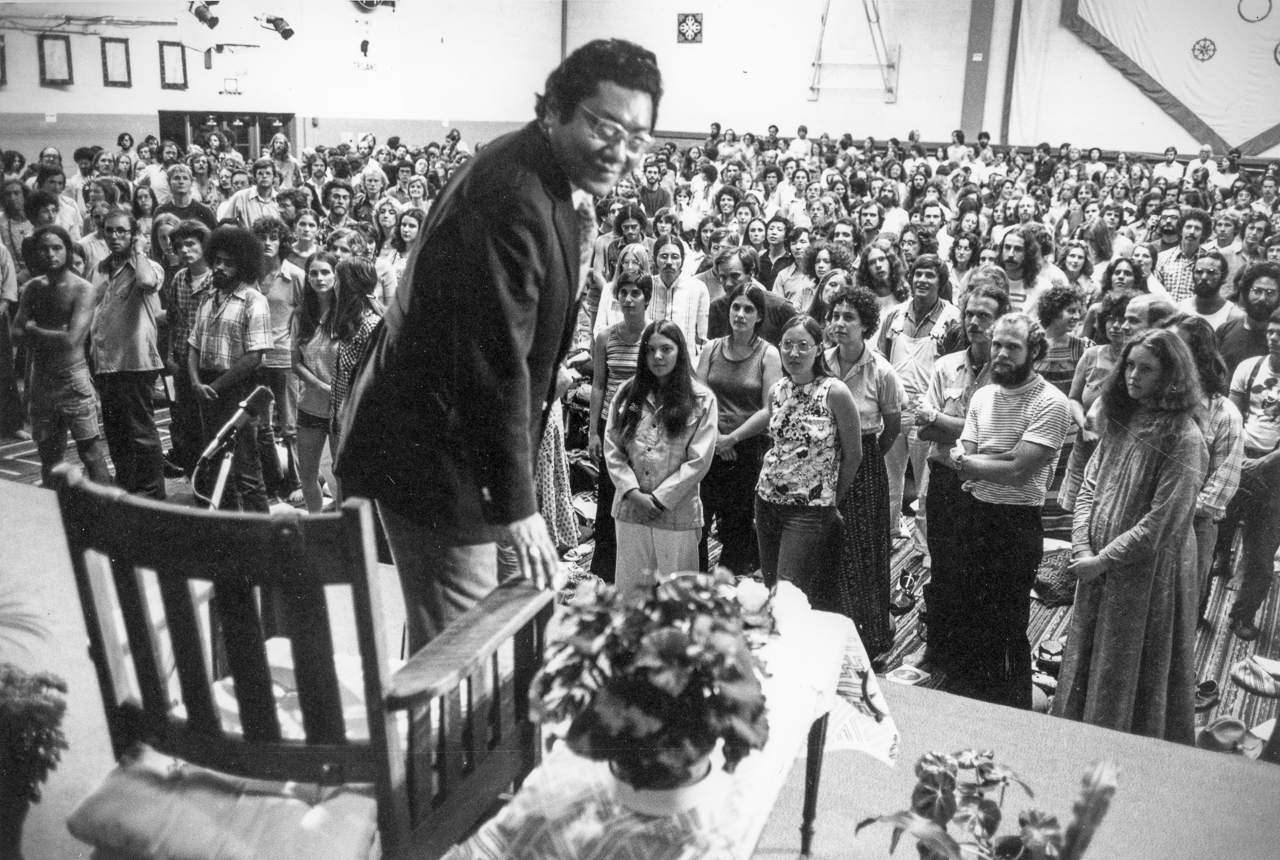
The Naropa Collection
The Naropa Collection is a gateway into the depth of Chogyam Trungpa’s world and teachings, and the transformative early years of Naropa University. As such, it brings to life a powerful era in the history of Buddhism and culture in the West altogether. The Chogyam Trungpa Digital Library now makes these landmark teachings available for study and reflection for the first time.
The Naropa Collection includes every recorded teaching, seminar, and event that Chogyam Trungpa taught at at Naropa Institute between 1974 and 1985. What you will find are major seminars on Buddhism, meditation, and Buddhist aesthetics; public talks on the arts, spirituality in America, psychology, and enlightened society; and addresses at major conferences on psychology and interreligious dialogue, and the 25th Anniversary of On the Road Conference in 1982. Also included are recordings and videos of historic poetry readings, interviews, and special events.
At the end of this article you can browse a curated selection of highlights from the Naropa Collection.
Naropa Institute
The Founding of Naropa Institute
In 1973, Chogyam Trungpa and a small group of students began plans for a school that would incorporate Buddhist principles and ideas into traditional liberal arts education. Naropa Institute opened its doors the following year in Boulder, Colorado, with a summer program offering classes in Buddhism and the arts. Naropa’s founding, however, was so timely in an era of exploding interest in spirituality, Buddhism, and experimentation in the arts that over 1,500 students — more than five times what had been expected — arrived for the first summer session.

By 1976, Naropa Institute was offering year-round B.A. and M.A. programs, and was known internationally as a laboratory making the connections between contemplation, education, the arts, and psychology as avenues to cultural change.
Faculty in Naropa’s first years, in addition to Chogyam Trungpa, included notable figures such as John Cage, Maezumi Roshi, William Burroughs, Allen Ginsberg, Ram Dass, Joan Halifax, Gregory Bateson, Eido Roshi, Anne Waldman, Herbert Guenther, Robert Creeley, and others.
Naropa also helped incubate the contemporary mindfulness movement, with its early faculty including Jack Kornfeld, Daniel Goleman, Sharon Salzberg, Mark Epstein, and Mirabai Bush.
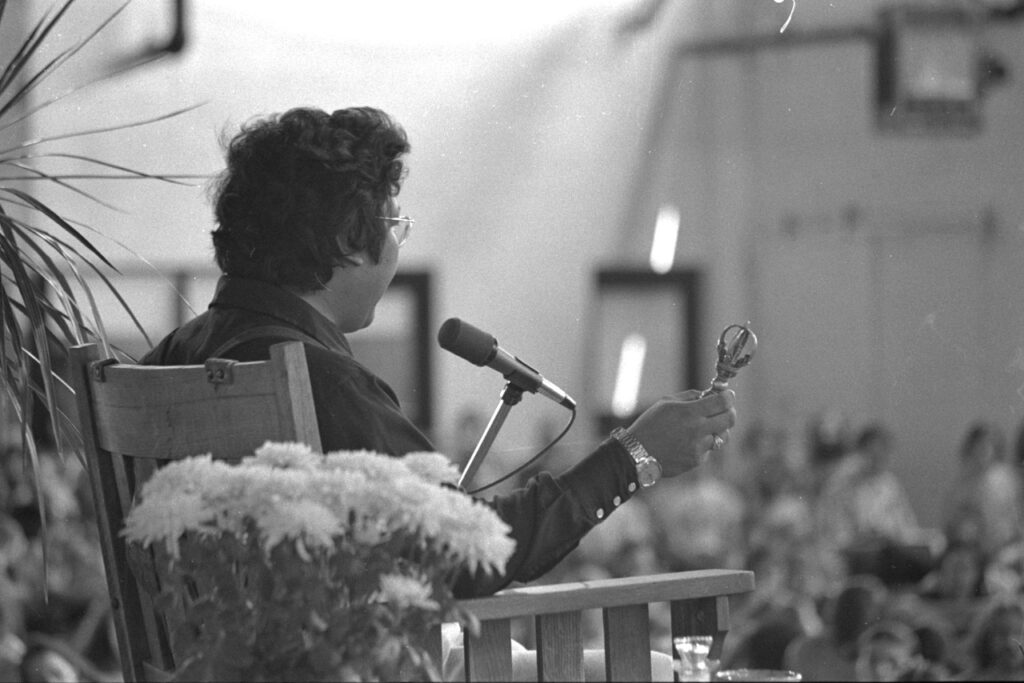
Chogyam Trungpa at Naropa
Naropa Institute would remain a major focus of Chogyam Trungpa’s attention and energy over the entire 17 years of his teaching in North America. From the beginning, his seminars and courses on Buddhism and other subjects were a highlight, if not the centerpiece, of Naropa’s programming.
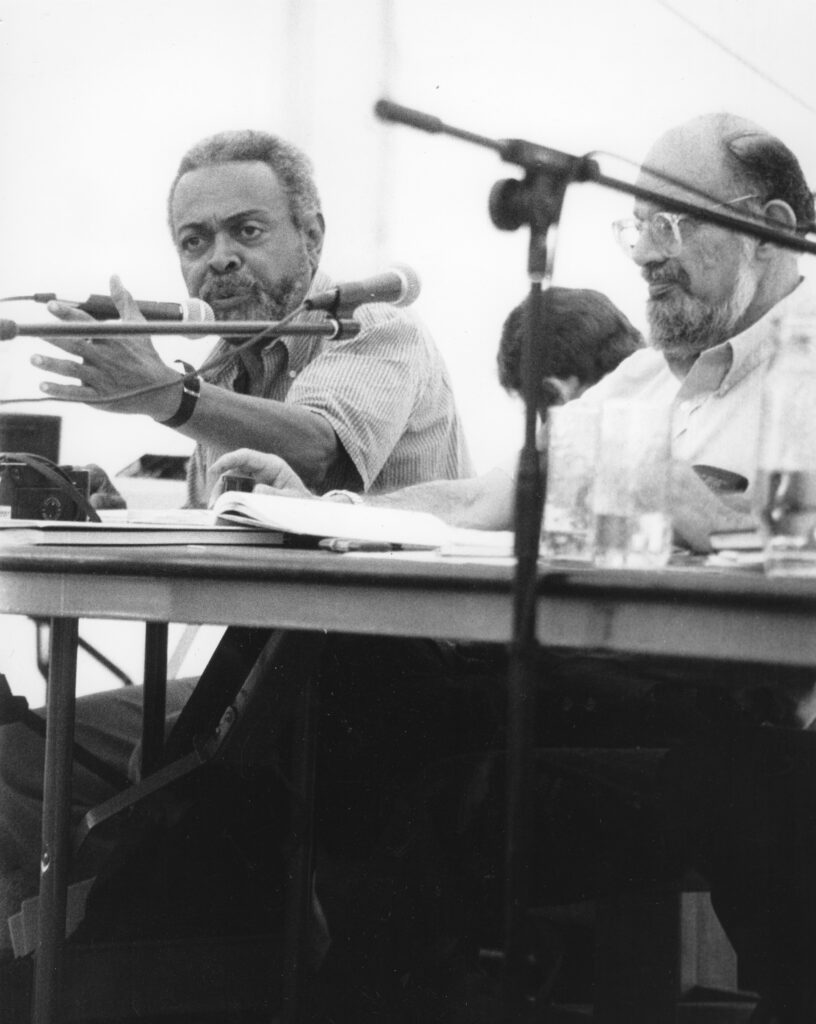
Trungpa Rinpoche also collaborated closely with faculty and visiting artists, scholars, and spiritual teachers, making Naropa a completely unique crossroads where the intersections between spirituality and the liberal arts broke new ground in those disciplines and in the culture at large.
Naropa Institute also hosted landmark conferences in psychology, interreligious dialogue, and the arts, and was the site of one of the most innovative writing programs in America, The Jack Kerouac School of Disembodied Poetics.
Buddhism in the West
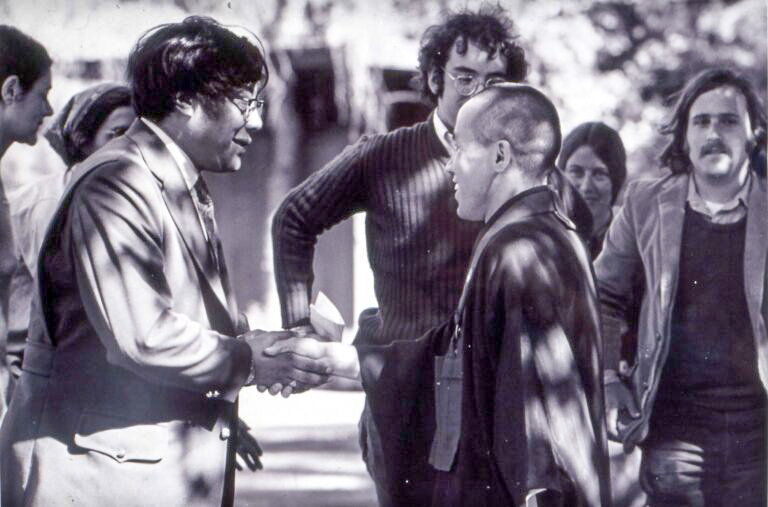
Naropa Institute became a primary forum where Chogyam Trungpa introduced the complete Buddhist teachings to Western students for the first time. The 1970s and 1980s were a formative period for Buddhism in the West, with a handful of teachers in the Zen, Tibetan, and Theravadin traditions arriving to teach in America. Trungpa Rinpoche was the first Tibetan to teach entirely in English, and infused his teachings with an exceptional grasp of both the English language and the Western mind, which allowed him to present the traditional Buddhist teachings in an entirely new and accessible idiom. Naropa Institute was also the first setting where Trungpa Rinpoche taught the secular Shambhala path to a large public audience. Many of the teachings he gave at Naropa became the basis of landmark books on Buddhism published both in his lifetime and after.
Naropa Today
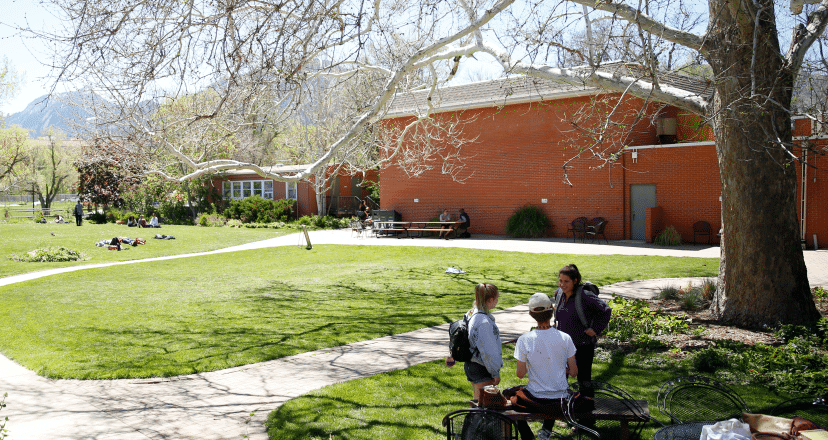
Naropa University is recognized as a primary incubator of the contemporary mindfulness movement, with contemplative approaches and disciplines infusing all the programming there from the beginning. Today, Naropa is a fully accredited university with graduate and undergraduate programs in numerous disciplines. It is especially noted for its influential psychology program. Naropa’s original founder, Chogyam Trungpa, remains a major influence on both the direction and spirit of the university.
Naropa Collection Highlights
With more than 170 recordings of talks on a wide range of themes in the Naropa Collection, it can be hard to know where to begin!
You could view this list of all the talks in the collection and see where serendipitous discovery takes you.
Or, you could start your exploration with this curated selection of highlights from each of the major teaching themes:
Meditation and Mindfulness
- Meditation: The Way of the Buddha: Talk 1: Meditation Instruction
- Meditation: The Way of the Buddha: Talk 2: Shamatha
- Meditation: The Way of the Buddha: Talk 4: Vipashyana
- The Tibetan Buddhist Path: Talk 11: Meditation and the Fourth Moment
Buddhism: Foundations
- The Tibetan Buddhist Path: Talk 1: Spiritual Materialism
- The Tibetan Buddhist Path: Talk 3: The Three Marks of Existence
- The Tibetan Buddhist Path: Talk 6: Karma and Rebirth
- The Yogic Songs of Milarepa: Talk 6: Discipline and Aloneness
Buddhism: Mahayana and the Bodhisattva Path
- The Tibetan Buddhist Path: Talk 9: Bodhisattva and Paramita
- Viewing and Working With the Phenomenal World: Talk 7: Shunyata
- The Bodhicharyavatara: Talk 9: Exchanging Self for Other
Buddhism: Vajrayana and Tantra
- Tantra: Journey Without Goal: Talk 2: Vajra Nature
- Tantra: Journey Without Goal: Talk 3: Mandala Principle
- Tantra: Journey Without Goal: Talk 10: The Five Buddha Families
Art and Aesthetics / Dharma Art
- Iconography of Buddhist Tantra: Talk 1: Symbolism in Everyday Life
- Visual Dharma I: Talk 2: Space, Sacredness, and Sanity
- Art and Sanity: Talk 2: Mind: The Ground and Path of the Artist
Shambhala / Enlightened Society
- Warrior of Shambhala: Talk 1: Fearlessness and Shambhala Vision
- Warrior of Shambhala: Talk 3: The Genuine Heart of Sadness
- Visual Dharma I: Talk 3: Great Eastern Sun
Poetry and Poetics
- Poetry Reading – video of readings by Anne Waldman, Allen Ginsberg, and Trungpa Rinpoche
- Meditation and Poetics: Class Discussion – Trungpa Rinpoche visits Allen Ginsberg’s class
- For more background, check out our article on Poetry and Poetics
Contemplative Education
- Public Talk: Education for an Enlightened Society
- For more ideas, check out our Contemplative Education Playlist
Interfaith Dialog
- Open Secret: On Religion – a panel discussion with Trungpa Rinpoche, John Maraldo (Zen), Josh Heckelman (Judaism), Harvey Cox (Christianity), moderated by David Rome
- Comparing the Heart – a dialogue between Father Thomas Keating and Chogyam Trungpa
Death and Dying
- Open Secret: Life, Death, and Dying – a panel discussion with Trungpa Rinpoche, Stanislav Grof, and Joan Halifax-Grof
- The Tibetan Book of the Dead – interview with Trungpa Rinpoche and Francesca Fremantle
Spirituality in America
Psychology and Psychotherapy
- Becoming a Full Human Being – a meeting with Naropa’s MA Psychology students
- Creating an Environment of Sanity – a talk to the 1979 Psychology Symposium